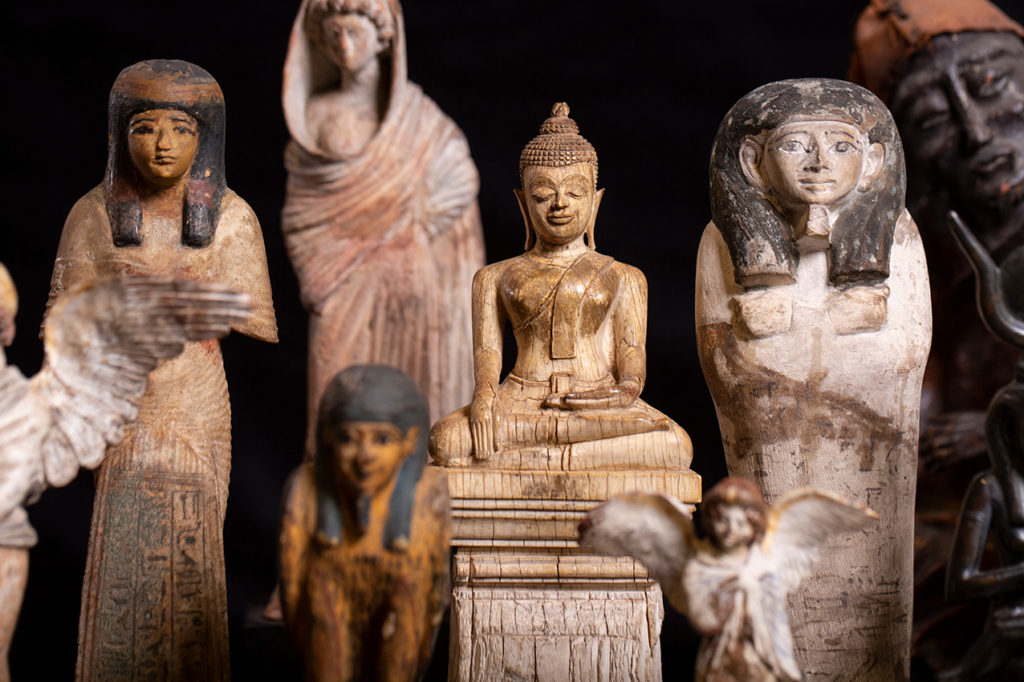Home Is Where The Heart Is – Part 2
Departure 3.25 Orient Express… Saturday 3rd (4th) June 1938
20 Maresfield Gardens… Tuesday 27th September 1938
These two entries in Sigmund Freud’s diary bookend a period of time in which the founder of psychoanalysis journeyed from his former home on Bergasse in Vienna to what he referred to as his ‘last address on this planet’, 20 Maresfield Gardens, now the site of the Freud Museum London. Travelling on the Orient Express, Freud and his party made first for Paris, and then finally arrived in London on Monday 6th June, taking a house on Primrose Hill for 3 months whilst his son Ernst went about the business of finding a permanent home for the family.
It was during the stopover in Paris at the house of Freud’s friend and colleague Princess Marie Bonaparte, that he was reunited with his favourite antiquity, Athena, which the princess had managed to smuggle out of Vienna for him. In a letter to the princess dated 8.6.38, Freud hinted at the importance that this reunion held for him, now his party was able to leave, ‘proud and rich under the protection of Athene’. The princess of Greece, Freud’s protector and benefactor, who helped apply the diplomatic pressure and financial resources that facilitated his last-minute departure from Nazi occupied Vienna, is metonymically associated with the powerful goddess, under whose protection Freud and his party were able to arrive ‘proud and rich’ at their destination. Such a comparison has echoes of Aeschylus’s The Eumenides, final part of The Orestea, in which Athena enters the city of Athens to finally end the cycle of violence which is overseen by the furies. Athena, the princess, will lead Freud and his party from the barbarism of Nazi occupied Vienna to the (relative) civilisation of Hampstead, a leafy suburb in North London.
Antiquities
Freud’s collection of antiquities played a central role in the structuring of a reality that was predicated on the principles of psychoanalysis. The practice of collecting grew in symbiosis with the development of his psychoanalytic theories, weaving its way into the warp and weft of Freud’s new science. His interest in antiquities can be dated from the time that he began to write the first great book of psychoanalysis, The Interpretation of Dreams. Writing to his friend and greatest inspiration at the time, Wilhelm Fliess, he describes how his ‘grubby little gods’ were acting as ‘paperweights’ for the pages of his magnum opus. But more than in this practical dimension, Freud’s objects maintained a creative and transformative function, as Marina Warner writes in her preface to the museum’s catalogue; they were also ‘tools of thought, the kitchen utensils of his imagination’.
In the first part of this blog series, we looked at Phillip Larkin’s poem, ‘Home is So Sad’ in which the objects of the home seem to bear witness to a sense of loss and disappointment; the ‘joyous shout out to how things ought to be/ Long fallen wide’, was evoked by ‘The music in the piano stool. That vase’. The objects in Freud’s collection, rather than being mute and passive place-holders of a paradise lost, seemed to contribute to the creative frisson that was essential for the development and flourishing of his theories.
Return of the Gods
In H.D.’s affectionate and sensitive account of her analysis with Freud, A Tribute to Freud, she writes of how she sent a bunch of gardenias to the founder of psychoanalysis when he had settled in his new home, accompanied by a note reading, ‘to greet the return of the Gods’. At her final encounter with Freud at Maresfield Gardens, she recalls how the gods were ‘suitably arranged on ordered shelves’. Civilisation had conquered barbarism.
The arrival of Freud’s collection from Vienna was crucial for his peace of mind, and his ability to leave behind the chaos and destruction that his former home was being overtaken by. In this vein, Michael Molnar, in his commentary to the entry in Freud’s diary from Sunday 7th- Monday 8th August which reads ‘Things arrived’, writes of how Freud had suggested that not until his collection had arrived from Vienna would he truly feel ‘Nazifrei’ (free from the Nazis). The gods had returned, not to a place, but to Freud himself, having been his companions and inspirations along his journey through the unconscious, which he had christened with the name, ‘psychoanalysis’.
You can find out more about the circumstances surrounding Freud’s departure from Vienna in our catalogue Leaving Today. Freud’s favourite objects have been the subject of two recent publications by the Freud Museum, Sigmund Freud’s Desk, and Sigmund Freud’s Collection.
All three titles are lavishly illustrated with original and archive photographs.




